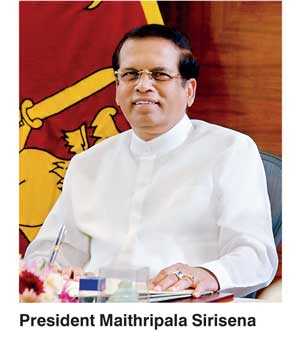Wednesday Feb 18, 2026
Wednesday Feb 18, 2026
Monday, 12 November 2018 01:12 - - {{hitsCtrl.values.hits}}
Fears of widespread violence, concerns over price tags being placed on elected representatives and the conduct of Speaker Karu Jayasuriya prompted the sudden dissolution of Parliament, President Maithripala Sirisena revealed yesterday while defending his decision. 
“It appeared to me that if I allowed Parliament to be convened on 14 November without dissolving it, it could have brought about commotion and violence in every city and village and would lead to a very unpleasant and difficult situation for the average citizens of my beloved country,” he said in his address.
Offering legitimacy to claims of parliamentarians being bought over, President Sirisena, in his third address to the country in the last two weeks, said that the prevailing situation had led to the dissolution of Parliament.
The President noted that by last week the price of a Member of Parliament ranged from an “estimated Rs. 100 million to Rs. 150 million, and in one instance it was as high as Rs. 500 million.”
The President stated the situation escalated with the lobbying of support for Mahinda Rajapaksa, the Prime Minister who was appointed by him on 26 October.
The conduct of the Speaker of the eighth Parliament, Karu Jayasuriya, was the second reason which led to his decision to opt for early elections, Sirisena asserted.
Noting that Jayasuriya’s moves not to recognise the appointment of a Prime Minister by a President exercising his presidential powers was the second reason for dissolving Parliament, he accused the latter of “disregarding Standing Orders and Parliamentary Conventions”.
Noting contradictions in Jayasuriya’s statements over the last two weeks, Sirisena pointed out that the former Speaker had backtracked on his acceptance of Rajapaksa as the new Prime Minister initially conveyed in his first statement.
“However, his second statement was a complete deviation from it. In that he stated that he recognises Mr. Ranil Wickremasinghe as the Prime Minister. I paid serious attention to this development. Members of Parliament from both sides issued various statements in the media that would have led to a big fight when Parliament was convened on 14 November. Some speculated that even the death of some members would occur.”
In an attempt to assuage widespread concerns of the misuse of state resources and funds, Sirisena noted that only the interim government, which comprises the President, Prime Minister and Ministers, was entitled to official vehicles and he threatened to use police force if the assets were not immediately returned to ministry secretaries.